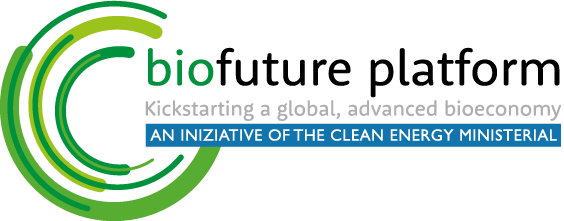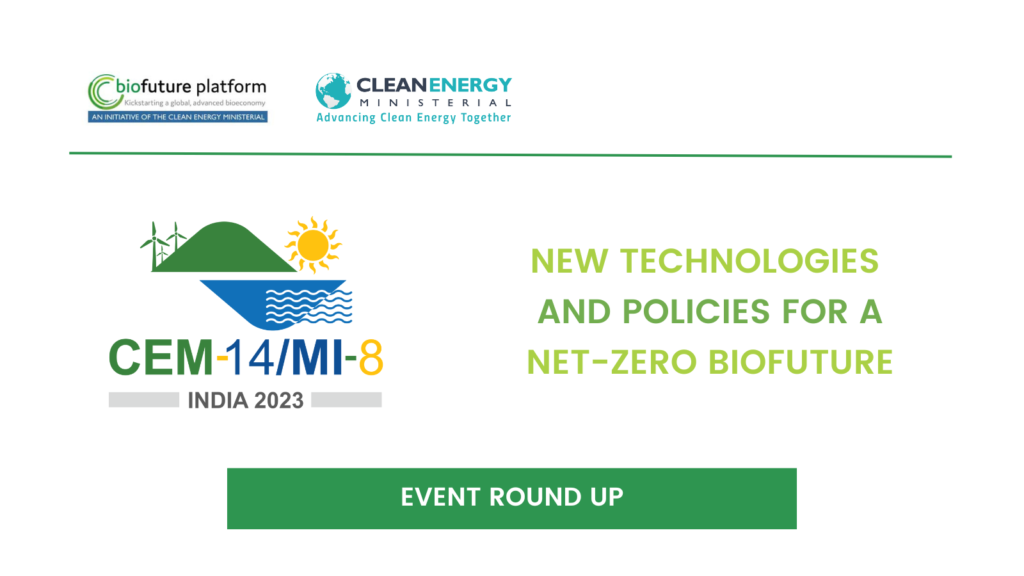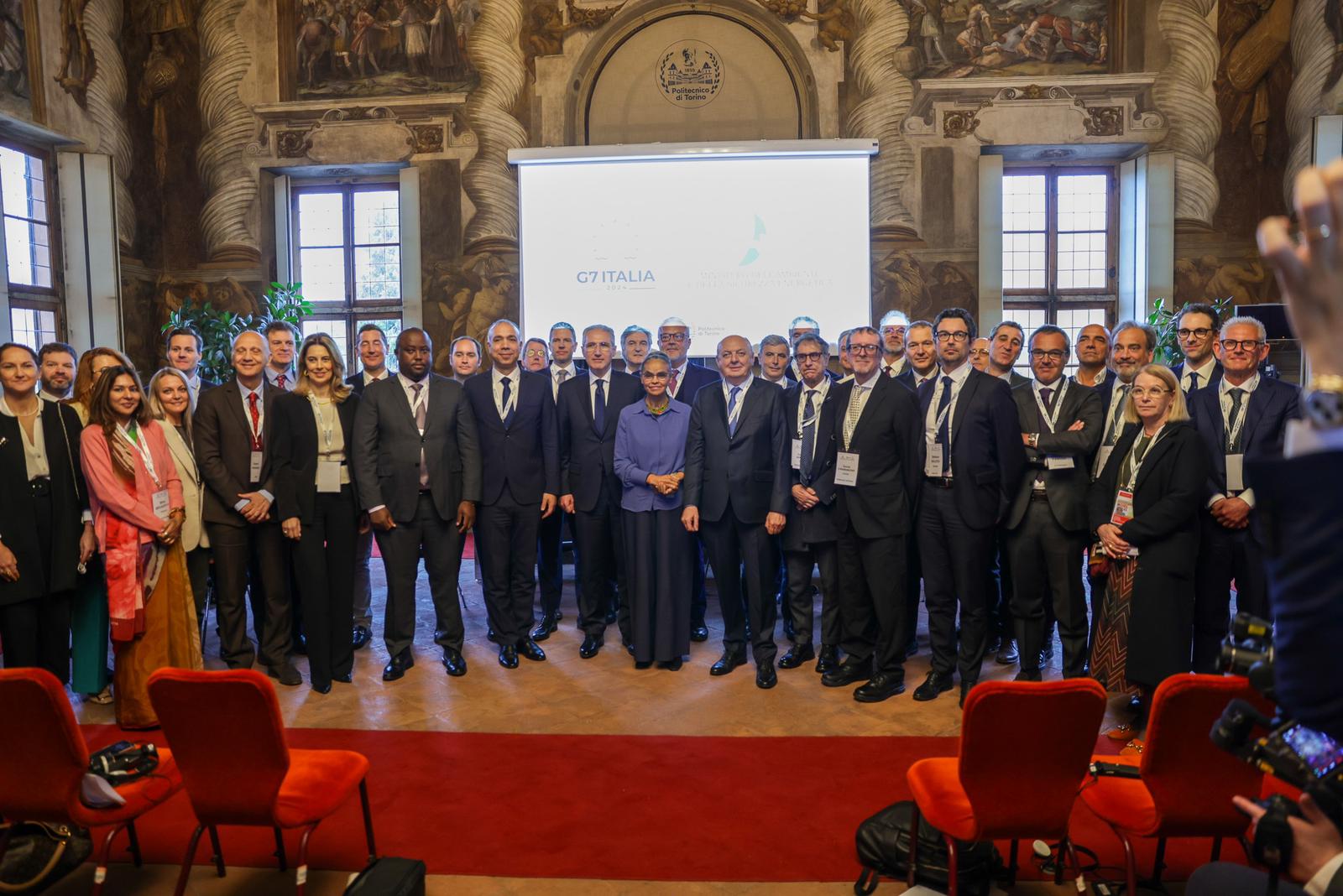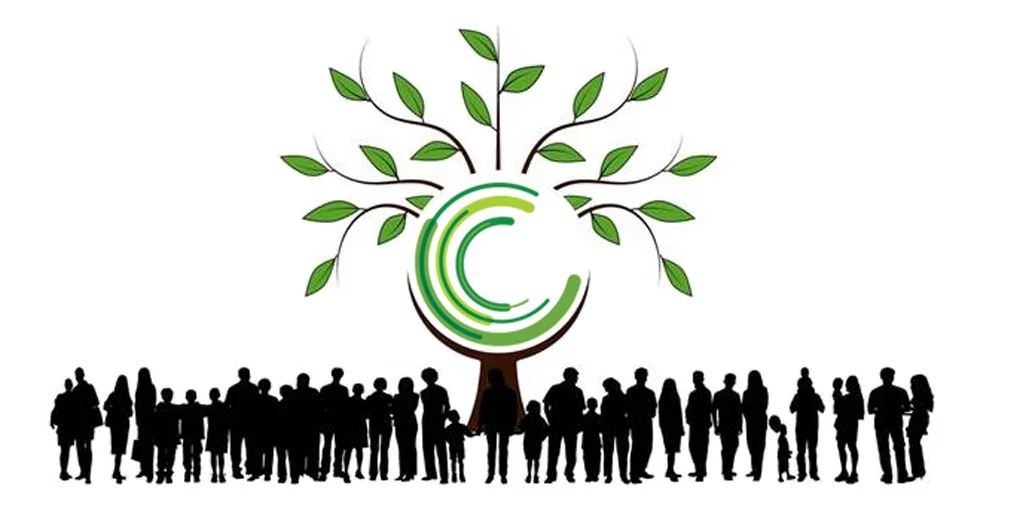CEM14/MI-8 Side Event 1.23
Summary
The CEM14/MI-8 Side Event on New Technologies and Policies for a Net-Zero Biofuture was held on 19 July 2023. The Side Event was organized by the CEM Biofuture Platform Initiative and the Co-leads of the MI Integrated Biorefineries (India and Netherlands). The purpose of the event was to enable partners from industry, academia, and technical agencies to share their views regarding how to accelerate development of new technologies and policies; thereby, shaping the workstreams of the CEM Biofuture Platform Initiative and the MI Integrated Biorefineries Mission.
The Side Event highlighted ways to overcome the technology and policy gaps needed to accelerate the development of sustainable liquid biofuels and bio-based chemicals. Attention was paid to the synergistic roles of CCUS and hydrogen in realizing a Net Zero Circular Economy, and to de-fossilizing hard-to-abate sectors including aviation, shipping, and petrochemicals. Participants considered how the Global Biofuels Alliance could advance policy best practices particularly in the Global South. The Side Event consisted of two technical sessions that (1) supported the launch of the Global Biofuels Alliance and (2) enabled a more detailed exchange in support of the CEM14/MI-8 CEO – Minister Biofuture Roundtable.
Key Takeaways
- Participants strongly encouraged international bodies, such as the Clean Energy Ministerial and Mission Innovation, to bring together governments, industry, research organizations, and international technical agencies to encourage national governments to enable the use of biogenic carbon to de-fossilize chemicals and materials.
- Participants encouraged CEM and MI to convene high-level, cross-cutting meetings between sectors. Bringing together experts and leaders from the clean energy and transportation sectors could accelerate de-fossilization of aviation, maritime, and heavy/long-distance road transport.
- Participants encouraged governments to develop performance-based policies that motivate greater efficiencies, performance-improvements, and reduction in carbon intensity across a number of sectors, including heating, cooling, transportation, and chemicals
Session Highlights
- Current technical challenges to bio-based technologies include the need to improve biomass conversion efficiencies and the need to be able to manage diverse types of biomass feedstocks, e.g., crops, crop residues, woody biomass, municipal solid waste, etc.
- Investments in systems and synthetic biology and biomanufacturing could drive technological breakthroughs in the synthesis of needed fuels, chemicals, and materials.
- Likewise research and development is needed to improve biomass yields; better crops for better products.
- Biomass feedstocks, and their environmental benefits, need to be better managed. Transparent databases and registries for feedstock production and its carbon accounting would enable valorisation of sustainable biomass and its use in bio-based industries.
- Innovation is required in biomass harvesting, handling, and transportation. Improvements are needed in technologies related to densification, liquefaction, and storage.
- Prescriptive policies that favor specific technologies tend to create market inefficiencies. Instead policies promoting the clean energy transition should be performance-based and focus on clear deliverables, such as reduction in carbon intensity for a given sector.
- The Government of India has supported the tremendous progress in developing ethanol for use in transport, and now India and other countries should advance its de-fossilization goals by supporting bio-based SAF and chemicals. To do so, India should invest in the biomass feedstock supply chain, work with investors to increase the funds available for CAPEX, and improve technologies to reduce OPEX.
- In Kenya, global carbon markets are being leveraged to make clean ethanol cooking cost-competitive for consumers and profitable for industry. Other governments should consider carbon markets as a means to bring sustainable, bio-based products to market.
- To de-carbonize hard-to-abate sectors, CEM and MI should catalyze cross-cutting dialogs. Specifically, the energy and transportation communities need to interact as much as they can . CEM and MI could break down silos and convene leaders from the clean energy and transportation sectors.
- In the case of Aviation, there is a huge mismatch between the ambition to use SAF and the ability to use SAF. Massive effort and investment is needed to scale-up SAF production.
Meeting Agenda
Session 1: Technology needs for liquid biofuels and bio-based chemicals
Moderator
Kees Kwant | Senior Expert Bioenergy and Liaison Biobased Economy & Mission Director, MI Integrated Biorefinery Mission
Speakers
- Sangita Kasture | Scientist/Director, Department of Biotechnology, MoS&T, India
- Rebecca Groen | CEO, Futuria
- Sangeeta Srivastava | Executive Director, Godarvi Biorefineries
- GB Deshpande | President/Technology, Praj Industries Ltd
- Ravi Gupta | Coordinator, DBT-IOCL Bioenergy Centre, GM R & D IOCL Faridabad
Session 2: Policy needs for liquid biofuels and bio-based chemicals
Moderator
Gerard J. Ostheimer | Manager, Biofuture Campaign
Speakers
- Preeti Jain | Global Director (Policy, Chemicals & Carbon Solution), LanzaTech
- Rajagopal Manohar | Bioenergy Marketing and Business Development Manager, Novozymes
- Sophie Odupoy | Group Head of Public Affairs, KOKO Networks
- Jari Kauppila | Head of ITF Secretary-General’s Office, International Transport Forum (OECD)





